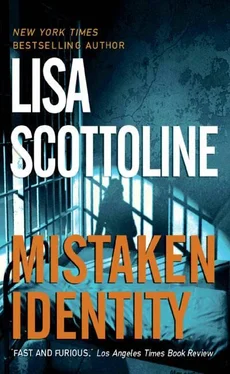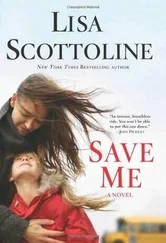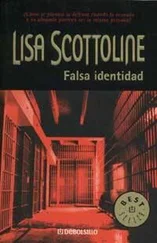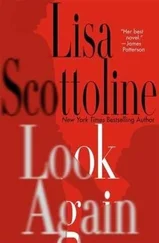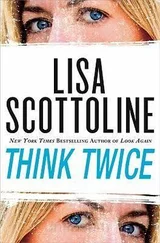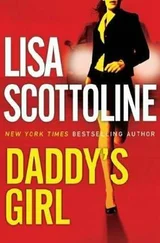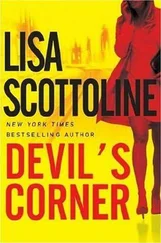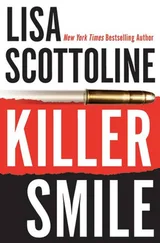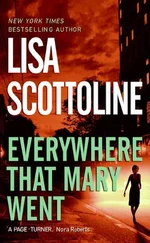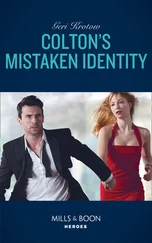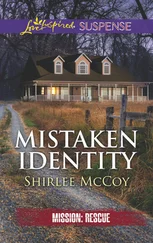Lisa Scottoline - Mistaken Identity
Здесь есть возможность читать онлайн «Lisa Scottoline - Mistaken Identity» весь текст электронной книги совершенно бесплатно (целиком полную версию без сокращений). В некоторых случаях можно слушать аудио, скачать через торрент в формате fb2 и присутствует краткое содержание. Жанр: Триллер, на английском языке. Описание произведения, (предисловие) а так же отзывы посетителей доступны на портале библиотеки ЛибКат.
- Название:Mistaken Identity
- Автор:
- Жанр:
- Год:неизвестен
- ISBN:нет данных
- Рейтинг книги:5 / 5. Голосов: 1
-
Избранное:Добавить в избранное
- Отзывы:
-
Ваша оценка:
Mistaken Identity: краткое содержание, описание и аннотация
Предлагаем к чтению аннотацию, описание, краткое содержание или предисловие (зависит от того, что написал сам автор книги «Mistaken Identity»). Если вы не нашли необходимую информацию о книге — напишите в комментариях, мы постараемся отыскать её.
When confronted with the most challenging and the most personal case of her legal career, Bennie Rosato-an expert on police corruption-questions everything she has learned as a criminal attorney, and everyone she considers to be family. During a visit behind the bars of Philadelphia 's Central Corrections facility, Bennie is shocked to discover that an inmate bears a striking physical resemblance to herself. The prisoner, Alice Connolly, stands accused of murdering her cop boyfriend Anthony Della Porta, and the case reeks of a police conspiracy. Connolly convinces Bennie to defend her in court. Bennie feels confused, intrigued, and even somewhat elated by this clone of herself, and dives head first into a bubbling cauldron of corruption, drugs, murder, and assault-mixed in with a thought-provoking subplot that questions the intricacies of legal ethics.
Mistaken Identity is Lisa Scottoline's sixth and tastiest dish yet. The book is gripping and smart, and it brings into bloom the highly likable character of Bennie Rosato, who made her debut appearance in Legal Tender. Bennie has her vulnerable moments-we witness this when, in some emotional scenes, she doubts the authenticity of her twin. Still, Ms. Rosato is no shrinking violet, especially when it comes to exposing the questionable goings-on of Philadelphia 's Eleventh Precinct.
Scottoline keeps us in a bubble of suspense-is Connolly really Bennie's twin? Did she murder Della Porta? If not, who did and why? The author neatly ties all our unanswered questions together into a perfectly formed bow, and keeps us frantically turning pages until the very end.
From Publishers Weekly
Double jeopardy is more than just a legal term in this taut and smart courtroom drama by Edgar Award winner Scottoline. Bennie Rosato, the irrepressible head of an all-female Philadelphia law firm, moves to center stage after playing a supporting role in the author's previous novel, Rough Justice. Bennie's client is tough, manipulative Alice Connolly, charged with murdering her police detective boyfriend, who may or may not have been a drug dealer. Complicating matters is Alice 's claim to be Bennie's identical twin sister and to have been visited by their long-lost father. Despite her wrenching emotional reaction to this revelation and her mother's deteriorating health, Bennie puts her personal and professional life on the line, immersing herself in the case. She enlists the aid of her associates, Mary DiNunzio and Judy Carrier, as well as Lou Jacobs, a cantankerous retired cop she hires as an investigator. They discover that a web of corruption may have enveloped the prosecuting attorney and judge who are now trying Alice 's case. Scottoline effectively alternates her settings between prison, law office, courtroom and the streets. Readers familiar with her previous work will enjoy the continuing evolution of the characters' relationships. Judy is still the bolder of the two associates, her experiences highlighted this time by an amusing venture into the seamy world of pro boxing. But Mary, until now a timid and reluctant lawyer ("Maybe I could get a job eating"), emerges from her shell. Scottoline falters occasionally by resorting to ethnic stereotypes, particularly in her dialogue, but generally succeeds in creating a brisk, multilayered thriller that plunges Rosato Associates into a maelstrom of legal, ethical and familial conundrums, culminating in an intricate, dramatic and intense courtroom finale. Agent, Molly Friedrich. Major ad/promo; author tour. (Mar.) FYI: Mistaken Identity is one of the six books excerpted in Diet Coke's marketing campaign.
